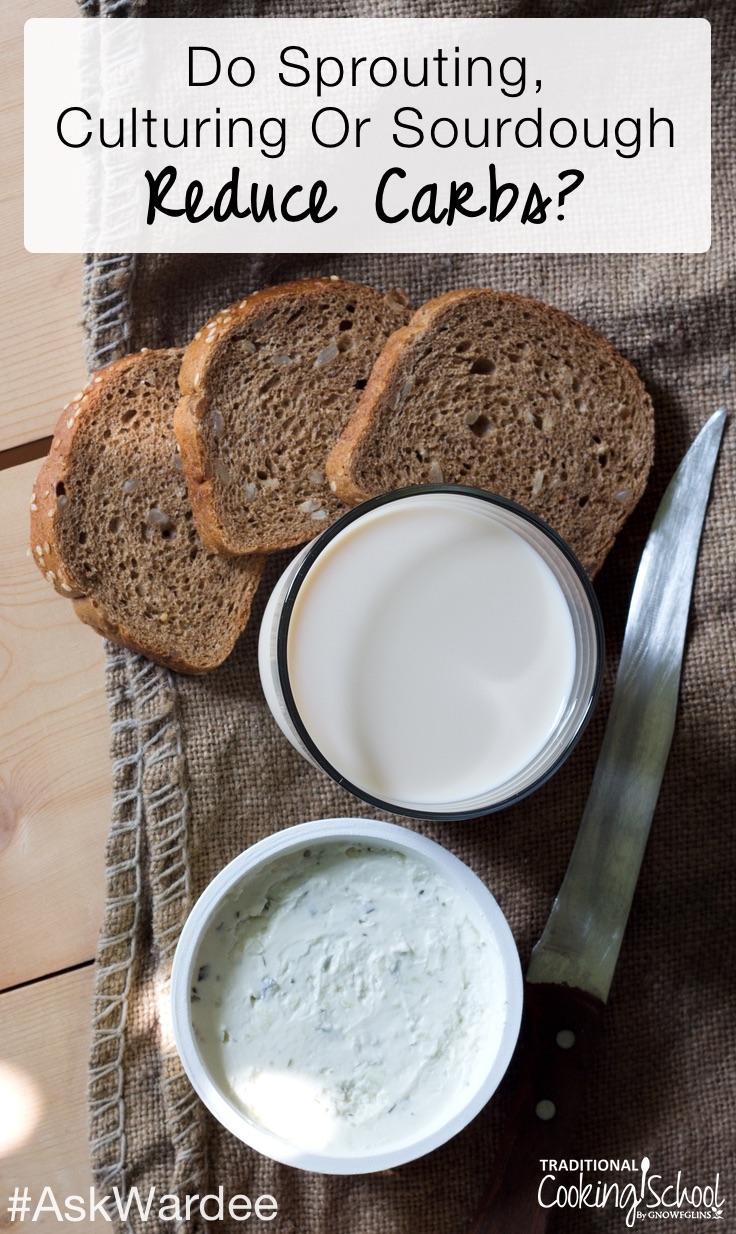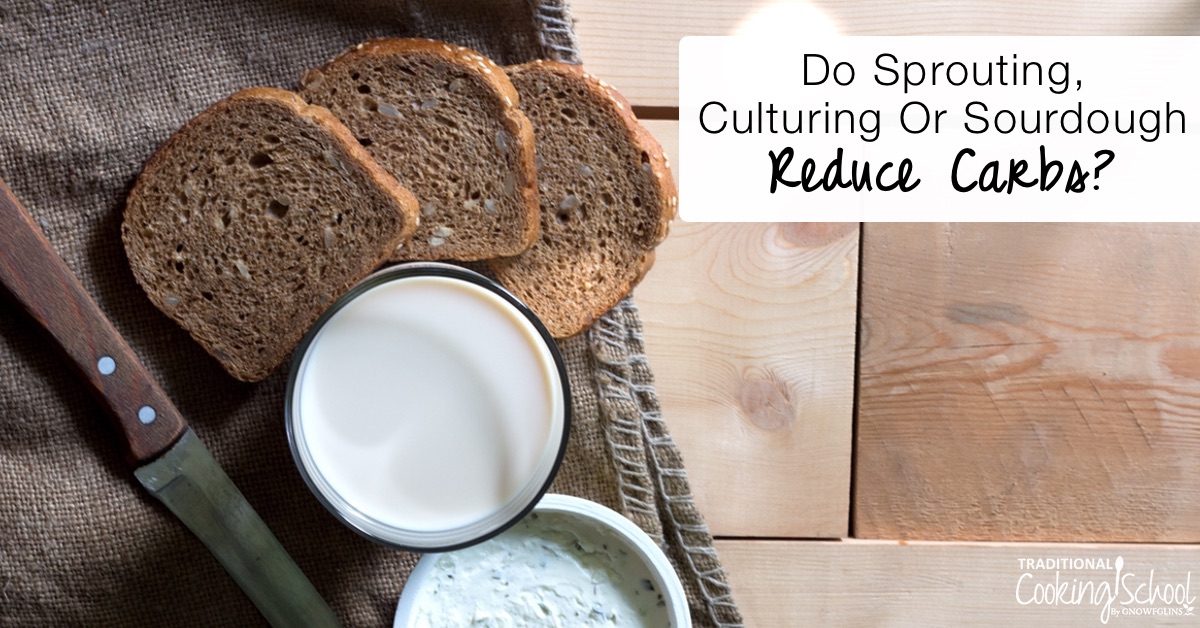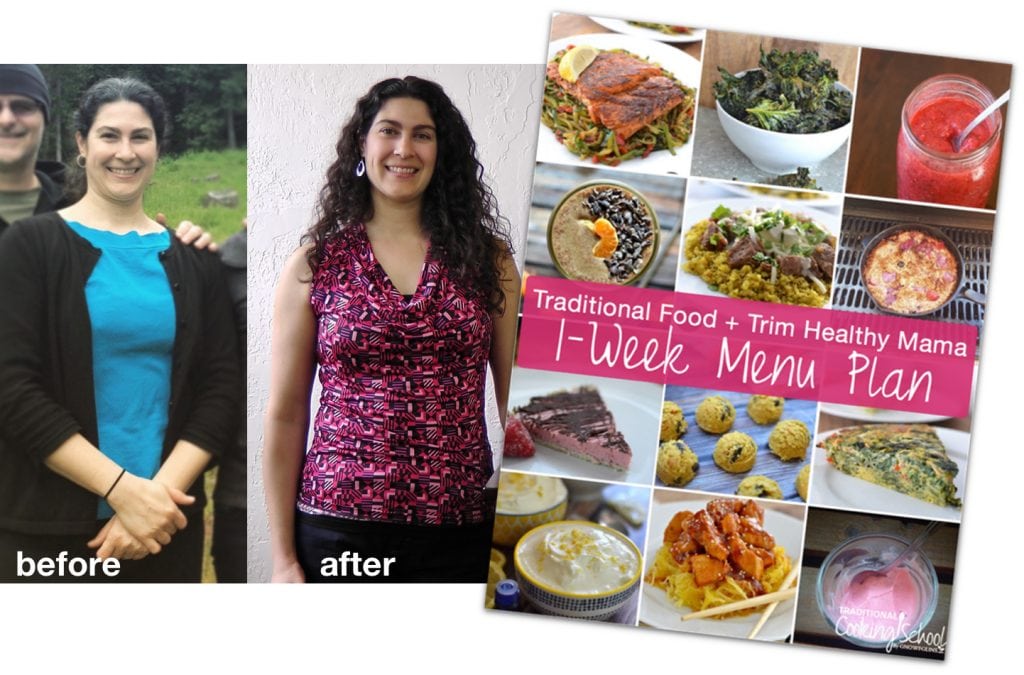
One of the best ways to lose weight is to reduce excess sugar consumption…
…and did you know that grains, beans, and dairy contain “sugar” as well?
Yes — they are called “carbs”. The starches in grains, beans, and dairy behave much like sugar in our bodies.
Which, in a healthy person, might not be an issue at all…
Yet for others — those with gut issues, excess weight, diabetes, or hormone imbalances — it really helps to pay attention to how many of these carbs we’re consuming.
For some, this means eating none of them.
For others, it means scaling back or only eating them at certain times (ala Trim Healthy Mama).
Which leads me to today’s question…
If we use traditional food preparation methods like soaking, sprouting, or sourdough (fermenting) with grains, beans, or dairy, do these processes reduce the carbs in these foods?
Here’s the answer… (short version: it depends!)
Check out the particulars in today’s #AskWardee in print, podcast, or video below!
Subscribe to #AskWardee on iTunes, Stitcher, YouTube, or the Podcasts app.
The Question: Do Sprouting, Culturing, Or Sourdough Reduce Carbs?
Mathew M. asked:
I have been a member for close to a year. I have a couple of questions. I am trying to bring down my weight and at the same time improve my health and immunity (actually for all my family). One way I am trying to do it is to reduce my carb intake. When sourdough is made from spelt/einkorn or sprouted wheat, are the anti-nutrients, gluten, carbs and sugar reduced, too? Does kefir made from grass fed raw A2 milk contain carbs or sugar? Does sprouting eliminate carbs and anti-nutrients from legumes/lentils or beans?
My Answer: It Depends…
Don’t you love it when I say that? 😉
Well, it’s true in this case because we’re talking about different methods (soaking, sprouting, or souring) and different foods (grains, beans, dairy).
All of these foods have carbs. Grains and beans have starches, and dairy has lactose (milk sugar).
Soaking doesn’t really reduce carbs so I’ll leave it out of the rest of the discussion.
Yet, sprouting and souring (fermenting) can reduce carbs if done long enough — because consumption of the “sugar” in these foods is part of these two processes and how it works.
Let’s break it down now…
Sprouting And Souring Grains (& Beans)
When you sprout grains, you’re taking them from their storage state (a seed) to a young plant (a seedling). During this conversion, involving warmth and water (just as if they were planted in the ground!), the stored starches turn into food for the young plant. Voila, the carbs are reduced.
When souring grains, the fermenting organisms use the starches in the grain as their food source. The longer the souring, the more the carbs are reduced.
How much are they reduced, though? As I told you in #AskWardee 035: Is Sourdough Bread Low Glycemic?, souring bread changes the glycemic index from high to low. However, bread is still bread. There are still carbs in it.
And sprouted bread uses pretty young sprouts, so while I don’t know the exact degree to which the carbs are reduced, I don’t think it’s as significant as to make it carb-free. Certainly the carbs are lower, though!
You can also make bread with sprouted grains and get a further reduction in carbs by combining the two methods!
My best and easiest sourdough bread recipe is here: FREE No-Knead Einkorn Sourdough Bread Recipe.
Sprouting/souring beans is similar so I won’t discuss it separately.
What About Souring Or Culturing Dairy
Since there’s no sprouting of dairy, so let’s just talk souring — or culturing it. Like making kefir, yogurt, clabber, or other cheeses.
The culture that you introduce to the milk to create kefir, yogurt, or a cheese eats the milk sugar (lactose) as its food source.
The longer the culture is in the milk at the ideal culturing temperature, the more it eats the sugar (and the more sour the end product becomes!).
And although every culture is slightly different, we can say that a 24-hour ferment/culture of kefir or yogurt will reduce the carbs to virtually zero.
When making hard cheese, you’re looking at needing to age it 60 days to reduce the sugar.
Additionally, some cultured dairy will continue to age and reduce sugar even in cold storage, albeit more slowly.
By the way, here is my free thick raw milk yogurt recipe. I ferment it 24 hours to reduce the milk sugar 100%, therefore creating a carb-free cultured dairy. Grab it here if you’re interested! (You can also use pasteurized milk in this recipe.)
Briefly, I’ll address the A2 issue… This has nothing to do with the carbs, it has to do with whether or not the cow has a genetic defect that affects the casein (milk protein).
What About Trim Healthy Mama?
What we’ve been talking about today works well within Trim Healthy Mama, which I combined with Traditional Foods to lose more than 30 pounds in a year (and I’m keeping it off to this day).
Here’s how it works…
The fermented yogurt or kefir (homemade) has no sugar when soured for 24 hours or more. When full-fat, it’s an S (fat + protein). If it’s skimmed (skim the cream away) then it’s a Fuel Pull (just protein) and can be used in either S or E settings.
The sprouted or sourdough bread foods that have no added fat (like my FREE No-Knead Einkorn Sourdough Bread Recipe) work well eaten moderately in E (carb + protein) settings.
If you’d like a free 1-week menu plan that I put together that’s a lot like the foods I ate (and still eat), click here to sign up.
If you’d like to know more about Trim Healthy Mama with Traditional Foods (how I do it), check out these posts:
- How I Lost More Than 30 Pounds In 1 Year
- A Baker’s Dozen Of Tips For Doing Trim Healthy Mama With Traditional Foods
- If I Were Starting Trim Healthy Mama With Traditional Foods All Over Again…
- 19 Foods You Need To Start Trim Healthy Mama {the Traditional Food Way}
Helpful Links
- FREE Thick Raw Milk Yogurt Recipe
- FREE No-Knead Einkorn Sourdough Bread Recipe
- FREE 1-week Trim Healthy Mama “Purist” Traditional Food Menu Plan
- Is Sourdough Bread Low Glycemic? #AskWardee 035
- My Kefir Recipe
- Trim Healthy Table: Trim Healthy Mama’s GREAT new cookbook!
Do you use sprouting, sourdough or culturing to reduce carbs in foods? How is it working for you?
We only recommend products and services we wholeheartedly endorse. This post may contain special links through which we earn a small commission if you make a purchase (though your price is the same).




I’ve been using thm on and off..after watching your videos I’ve begun making sourdough, sauerkraut, bone broth, and cut out dairy. My husband’s allergies/asthma is practically GONE! I get raw cow and goats milk weekly and since we’ve been off of dairy I need to find something to do with the cow milk (our toddler drinks the goat milk)… can I make sour cream with the cream and kefir with the skimmed milk? Thank you!
Hi Mary,
Yes. Or just make the kefir with the whole milk and skim the soured cream off later. It will save time. That’s what Wardee does. 🙂
~ Millie, TCS Customer Success Team
my comment is a question. can powdered milk be used to make yogurt? every time i go to the local food pantry, i am given dry milk. overloaded and not sure how use that much.
Hi Sharon,
You may be able to. This isn’t something we’ve tried or teach. You could do a google search to see what comes up for making yogurt using powdered milk. 🙂
Sorry we can’t be of more assistance!
~ Millie, TCS Customer Success Team
I’m curious…if refrigerating sourdough slows down fermentation and you must increase the time, does heat speed up fermentation? If sourdough is proofed in a proofing oven/drawer/etc, can the time be reduced from the room temperature time?
Hi, Jana,
Heat does speed up the fermentation process. A proofing oven/drawer would give you consistent results and it may require less time than room temperature.
~Peggy, TCS Customer Success Team
I know Einkhorn like other heritage grains is healthier than modern wheat and I really appreciated the specifics! I wondered though how it compares to other heritage grains like spelt, kamut and red Fife wheat, do you know? Thank you for all your wonderful work!!
Hi, Tanya,
You are very welcome! Wardee stated in another post: https://traditionalcookingschool.com/food-preparation/the-best-healthiest-flours-for-sourdough-aw065/?swcfpc=1
“The other gluten-containing ancient grains — emmer, spelt, kamut — were all derived from einkorn. They are arguably healthier than modern wheat, yet still not the original form.”
I hope this helps.
~Peggy, TCS Customer Success Team
Hi. Can micro greens be used in bread dough? How do the nutrients of say broccoli microgreens compare to the full grown plant or sprouts (can you sprout broccoli?) Just curious like how fermenting, souring and sprouting change properties of the food, how about microgrowing stuff. I live growing microgreens in my kitchen.
Hi there,
I’m happy to help!
Here is an article that you may find interesting:
https://traditionalcookingschool.com/food-preparation/recipes/sprouting-grains-for-bread/?_rt=OXwxfHNwcm91dGluZ3wxNjM5NTg4NDI5&_rt_nonce=b81d840478&swcfpc=1
Sprouting is just 1 of the grain prep methods to make grains more digestible and nutritious.
It’s better than soaking but not quite as good as sourdough. You can using them in baking.
Also, in case you didn’t know, we have a Bible-based cooking program where Wardee and our teachers and moderators answer questions about Traditional Cooking (such as sourdough and fermenting or sprouting) via a private support group.
Here is a link for more info:
https://lp.traditionalcookingschool.com/lp/bible-based-cooking-program-direct/
~Peggy, TCS Customer Success Team